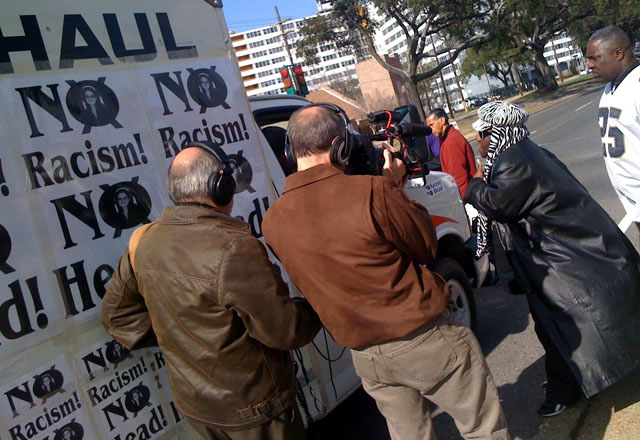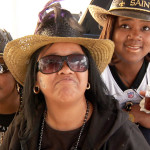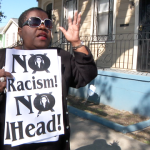
Revising the national legend, or, the U.S. people don’t know
Filmmaker Louis Alvarez says that social classes in the United States can be harder to identify than the various races or ethnic backgrounds but that, in many ways, that’s exactly what will allow a prediction of what opportunities someone will have in life.
“The topic is taboo in a society like ours, where the idea that we’re all equal and that the poor kid can become president is hailed as a national legend,” says Alvarez, who — for decades, along with documentary-maker Andrew Kolker — has sought clues with which to propose sociological and cultural maps of something as kaleidoscopic as U.S. society.
That has been the mission that has taken them from American Tongues (1987) to People Like Us: Social Class in America (2001) — their best known work — to Small Ball: A Little League Story (2004), to The Anti-Americans (a Love/Hate Relationship) (2007) to Getting Back to Abnormal (2013), always casting a humorous light on the phenomena they examine.
Last December, both were in Cuba for the first time. One of their movies had preceded them. In April 2014, Getting Back to Abnormal was shown as part of Closing Distances/Cerrando Distancias, a cultural exchange program organized by Americas Media Initiative that every year brings U.S. movies and producers to the island.
“Our movie apparently was well liked in Cuba. Something connected. That’s why they invited us to come. I had always wanted to come, so this was a timely excuse,” Alvarez says.
“Getting Back to Abnormal is about New Orleans, a city that shares many things with Havana. We wanted to capture its essence because it’s very unusual, partly because of the attitude toward races.
“There, whites and blacks interact but at the same time all — especially in politics — function as tribes. They care only about the interests of their group. All of that in the midst of a very poor city.
“After [Hurricane] Katrina [in August 2005], many questions came up and many documentaries were made. That is why we chose to wait until all the other filmmakers left so we could say calmly: ‘Now we’re going to examine the situation.’
“I think that Cubans were interested in the relationship between blacks and whites. That’s something that’s considered here, too. Except for some noticeable differences, it is possible to establish parallels between New Orleans and Havana. When [Abnormal] was shown along with Strawberry and Chocolate, the discussion was interesting.”
Q.: What is NewAmerica Media?
A.: Thirty-five years ago, my colleague Andy and I began to make movies about the United States people don’t know, which is different from Hollywood, from the media tales. All around us there were stories that we didn’t see on TV, so we decided that we wanted to tell them. That’s how NewAmerica Media was born.
We make unusual movies. We try to make the viewers laugh because that’s a very powerful way to communicate, especially with a documentary, because before Michael Moore documentaries in the U.S. were very serious all the time. Now, there’s a lot more humor.
The problem now is the reality shows, because they are phony but use documentary language. They’re very similar technically, but they manipulate reality for the sake of drama. We documentary makers don’t do that, so the competition is tough.
Q.: How do you approach poverty in a wealthy country? Why film it?
A.: My most famous movie is People Like Us and deals precisely with the social classes. Faced with the contention that there are no class differences among us — a myth fed by examples that seem to prove it right, e.g., Bill Clinton and Obama — we try to show it as the illusion it is, because a majority of the people are stuck in their classes.
I would say that this movie was the first in North America that gave an all-encompassing view of what we think about classes, including people who are very rich and others who are very poor. Not just the middle class. We tried to place a mirror before the citizens.
Q.: Did you ever run into problems while filming these social groups or those zones?
A.: Not usually, because we appeal to laughter and that enables people to have fun and the message to stick in a different way. The message stops being too controversial. Apparently, it “slips through.”
We have had problems with the corporations. One of our really poor characters worked at Burger King. We filmed her 10 years ago doing her job, cleaning toilets. We returned in 2013 to see how her life had evolved and Burger King shut us out.
Anywhere you go, you need permission from the owners. Sometimes they are thousands of miles away, in Hollywood or New York, and the easiest thing for your interlocutor to say is: “It is not allowed.”
It’s the main problem for documentary makers, regardless of the topic, unless it’s a matter of commercials for corporations — and I don’t want to do them.
When I began, 30 or 40 years ago, you’d enter everywhere with a camera and everybody was thrilled. Now, there is access and [the executives] know what can be done with an image.
That’s what’s happening with the media and the social networks. They don’t know what to do about it. The smartest ones say, “Okay, go ahead.” But not all of them.
Q.: What do you think of the Ferguson phenomenon?
A.: To me, it’s very sad, because I’m almost 60 and when I was 12, in 1967, there were many protests in several cities, including Milwaukee, where I lived. Detroit, New York, Cleveland, Los Angeles. For about three years there was much destruction. It was traumatic.
There were neighborhoods only for blacks — rich and poor blacks — which were destroyed by the protests. White neighborhoods weren’t. So, the rich blacks went to live in the suburbs, leaving the poor blacks in the destroyed nabes.
The whites, on the other hand, moved from the cities to the countryside. That was the pattern. The cities were reconfigured.
I’m saddened by this idea of fragmentation and Ferguson makes me feel that nothing has changed. Or maybe it has, but dragging along too many problems. I don’t think that it’s in the country’s agenda to keep the police from stopping you if you’re black, no matter if you’re rich or poor. That’s something that whites don’t have to worry about.
Something interesting is that those who make movies about this — documentaries or in Hollywood — are middle-class blacks. They’re the ones who are thinking about it. There are no poor blacks making these documentaries; they don’t have the tools.
 Q.: You have focused on other expressions of culture, other areas of social life, such as language, sports, domestic life. What has been your experience?
Q.: You have focused on other expressions of culture, other areas of social life, such as language, sports, domestic life. What has been your experience?
A.: The process of filming about dialects in different places in the United States was difficult, but the result [American Tongues] was very popular. Everywhere, you find charming ways of speaking, sometimes antiquated words that are used in very specific regions of the country.
We did a series about people during elections [Vote for Me: Politics in America]. They behave very differently from one state to the next. If you’re white, black or gay, the campaigns are made differently, so it has much to do with social classes.
We did a movie about Minor League Baseball [Small Ball] that was very popular. In fact, one of the families in it was Cuban-American. The father and the son were fanatics and the mother knew nothing about baseball. It was very charming. We followed the team around and discovered that they were very good. The kids were about 11 years old and came from California. We were very lucky because they reached the minor league World Series, but they lost.
We did two movies about women. One is titled Moms, with interviews with women about how they raise their children, what it’s like to be a mother. Some were good moms, others not so much.
The other film [Sex: Female] was about sex, women talking about their sex life.
Generally speaking, our point is that there are many ways to live, not just one. And because we interview so many people with different opinions, we make a map of the different ways of being and doing. That’s society. And we do it as a celebration of the huge diversity that we have in the United States.



